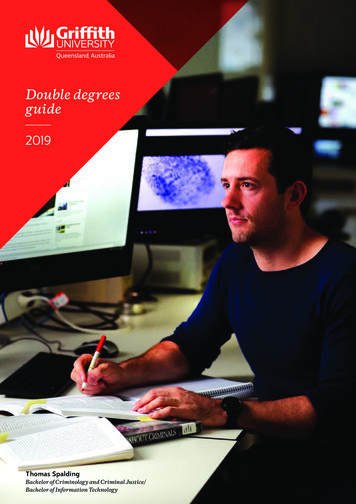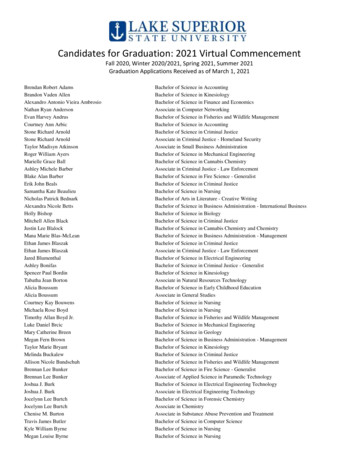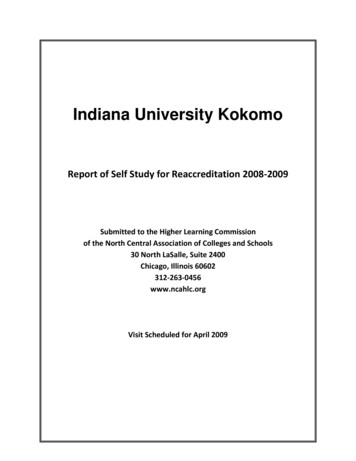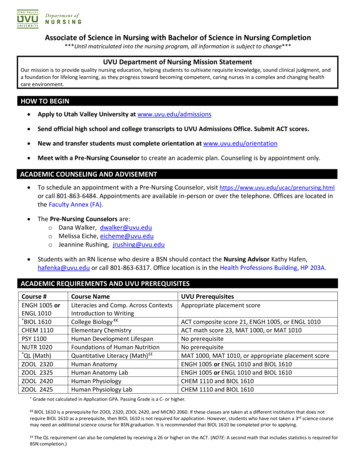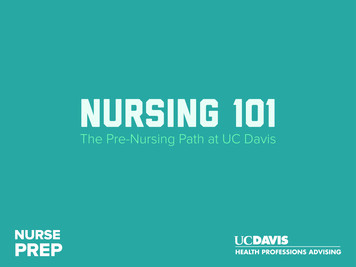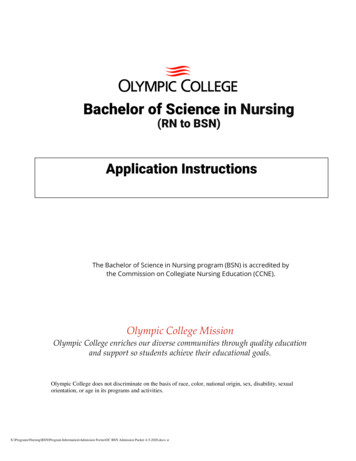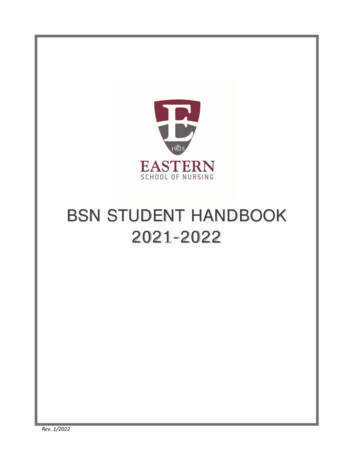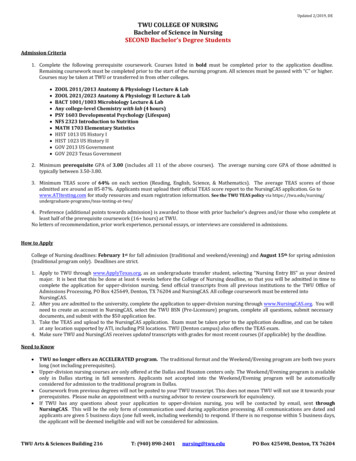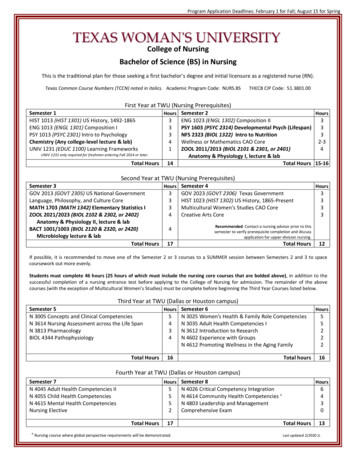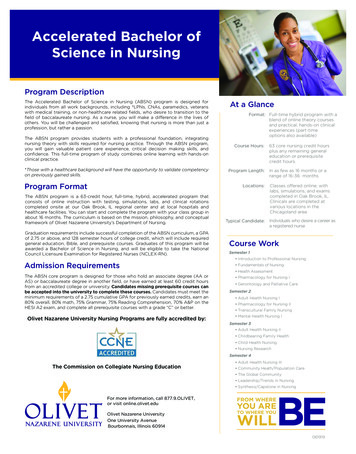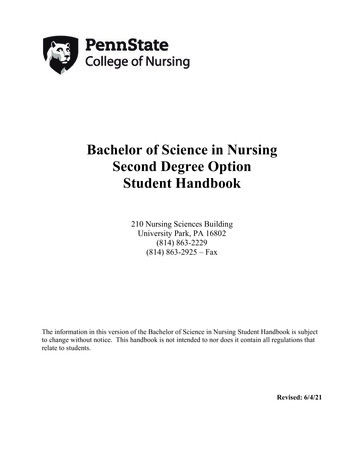
Transcription
Bachelor of Science in NursingSecond Degree OptionStudent Handbook210 Nursing Sciences BuildingUniversity Park, PA 16802(814) 863-2229(814) 863-2925 – FaxThe information in this version of the Bachelor of Science in Nursing Student Handbook is subjectto change without notice. This handbook is not intended to nor does it contain all regulations thatrelate to students.Revised: 6/4/21
Table of ContentsWELCOME FROM THE DEAN1WELCOME FROM THE ASSOCIATE DEAN FOR UNDERGRADUATE EDUCATION2COLLEGE OF NURSING CONTACT INFORMATION3COLLEGE OF E OF NURSING COMMITTEES5END OF PROGRAM LEARNING OUTCOMES6UNDERGRADUATE NURSING PROGRAM ACADEMIC POLICIES7Standards Of Conduct7Academic Integrity Statement7Class And Clinical Attendance Policy7Essential Functional Standards Required For Clinical Practice8Educational Equity14Disability Statement14Diversity Statement14Policy For Requesting Student Records15ACADEMIC ADVISING16Academic Adviser16Counseling And Psychological Services (Caps)18Additional Student Resources19UNDERGRADUATE NURSING PROGRAM CURRICULUM20Estimated Additional Cost For Nursing Students20Nursing Academic Requirements/Degree Audit21Math Policy For Pre-Licensure Students22Suggested Academic Plan24Nursing Course Requirements And Course Descriptions25Clinical Capstone28Clinical Preceptor EvaluationAssessment Technologies Institute (ATI)ATI Placement in the SCND B.S.N. Curriculum293031
ATI Point Structure33ATI Plan – Getting Started with ATI34ExamSoft Policy38Student Responsibilities for ExamSoft Use38Faculty Responsibilities for ExamSoft Use39Testing Session Procedures39Course And Clinical Scheduling41Undergraduate Program Enrollment41Re-Enrollment/Re-Entry/Delay in Program Progression Policy41Prior Learning and Transfer Credit43CLINICAL COMPLIANCE REQUIREMENTS44Timeline for Year One46Timeline for Year Two48Process If Not Compliant50Compliance Requirements (CR) #1-1551CR #1: Student Notification of Program Requirements Form51CR #2: Clinical Experiences Acknowledgment of Risk51CR #3: Student Consent for Release of Information to Authorized Third Parties51CR #4: Confidentiality, Safe Environment and Fiction Contract for Nursing Simulation 51CR #5: Sophomore Health Exam Form51CR #6: Personal Health Insurance51CR #7: Liability/Malpractice Insurance52CR #8: Cardiopulmonary Resuscitation (CPR) Certification52CR #9 - #11: Clearance Checks53General Information53CR #9: PA Child Abuse History Clearance (Act 151)53CR #10: PA Criminal Record Check (Act 34)53CR #11: Federal Criminal History Clearance (Act 73) and Fingerprinting (Act 171)55CR #12: Student Data Form57CR #13: Influenza (Flu) Immunization57CR #14: Drug Testing58CR #15: Consent, License and Release Agreement59Compliance Requirement Forms60Communicable Disease Update73CLINICAL POLICIES74
Precluded Students From Clinical Institution74Patient Care74Clinical Safety Policy74Impaired Student Nurse Policy75Infectious Disease Policy81Return To Clinical82Student Pregnancy Policy82Transportation To And From Clinical Agencies Policy82Student Dress Code Policy82Social Media Policy84Use Of Electronic Devices In Clinical Policy85Clinical Cancellation Guidelines86Simulation Laboratory Practice Option86Clinical Failure Policy86Guidelines For Using The Clinical Evaluation Tool And Remediation Form87ACADEMIC SUCCESS88Definition of Grades88College of Nursing Grading Scale88Nursing Course Examination Rounding Policy88Academic Success Program89Academic Success Plan91Academic Progression91Student Academic Difficulty92Plan for Early Identification of Academic Difficulty and Follow-up92Academic Grievance Procedures93Grade Mediation And Adjudication93NURSING OPPORTUNITIES95Protocol For Students Who Seek Outside Employment95Penn State Alumni Association / College Of Nursing Alumni Society95PROFESSIONAL CAREER DEVELOPMENT96National Student Nurses’ Association96Student Nurses’ Association Of Penn State (SNAPS)96SIGMA THETA TAU INTERNATIONAL Honor SOCIETY OF NURSING98Beta Sigma Chapter Membership98Sigma Theta Tau Achievement Award98
SCHOLARSHIPS AND AWARDSGRADUATING SENIORS: NCLEX EXAMINATION and RN LICENSUREInformation For Graduating Seniors99100100Professional Licensure/Certification Disclosure by State100Complete the Post-Graduation Contact Survey100Register for National Council Licensure Examination (NCLEX)100Submit Application for Licensure to ONE State100If applicable: Submit Application for Temporary Practice Permit (TPP)100Licensure Process102Licensure – Pennsylvania102Licensure - States Other Than Pennsylvania102Confirmation103Helpful Tips and Notes103RESOURCESLinks To Other Important InformationINDEXClinical Performance Evaluation Remediation Forms Index105105108108NURS 230 Student Clinical Performance Evaluation108NURS 251 Student Clinical Performance Evaluation114300 LEVEL Student Clinical Performance Evaluation120400 LEVEL Student Clinical Performance Evaluation126Academic Success Plan Index132Academic Success Plan Process – Course Exam Grade 77%132Clinical Success Plan Process – Clinical Skills136Academic Success Plan - General138
WELCOME FROM THE DEANWelcome to the Second Degree Bachelor of Science in Nursing (BSN) program at the Penn StateCollege of Nursing! Your choice of the nursing major represents a significant commitment on yourpart, and we hope that you find your studies personally satisfying.Penn State is a world-class university, with world-class resources. I encourage you to take advantageof the many learning opportunities provided by our Penn State community. Know that our faculty andstaff stand ready to help you succeed and to cheer you on.Best wishes for a successful program of study in the College of Nursing. The future of nursing will bein your capable hands---make us Penn State proud!Be Well,Laurie Badzek, LLM, JS, MS, RN, FNAP, FAANDean and ProfessorPenn State College of Nursing1
WELCOME FROM THE ASSOCIATE DEANFOR UNDERGRADUATE EDUCATIONCongratulations and on behalf of the entire faculty, welcome to the Second Degree Nursing program.We are pleased that you have chosen to pursue nursing and are here to support you as you begin yourjourney. Nursing is a rewarding profession with countless opportunities and you will affect manylives. Your commitment to investing the time and effort in the academically rigorous curriculum willdevelop your clinical competence and leadership skills.In addition to your classroom learning, you will have the opportunity to engage in rich and variedclinical experiences including multiple hospitals, community facilities and simulation that willprovide a sound educational foundation. Highly qualified masters and doctorally prepared nursingfaculty members are ready to guide your learning experiences.The College of Nursing and the University have assembled numerous resources to help you gain themost from your time here. Based on the experience of prior students, we have compiled thishandbook to help you access and use those resources; faculty and the advising staff of the College ofNursing can provide additional assistance.Nursing can provide a lifetime of rewards and we are committed to educating you in the best waypossible. Your commitment to Penn State will serve you well and we hope that your experience willbe all that you hoped.Wishing you a wonderful Penn State Experience.Raymonde Brown, PhD, RN, CNEAssociate Dean for Undergraduate EducationPenn State College of Nursing2
COLLEGE OF NURSING CONTACT INFORMATIONDeanDr. Laurie Badzek201 Nursing Sciences BuildingUniversity Park, PA 16802814-863-0245 (Phone)814-865-3779 (Fax)lzb340@psu.eduAssociate Dean for Undergraduate EducationDr. Raymonde Brown106 Nursing Sciences BuildingUniversity Park, PA 16802814-863-2235 (Phone)814-863-2295 (Fax)rab16@psu.eduAssistant Dean for Undergraduate Nursing Education at the Commonwealth CampusesDr. Michael Evans111 Dawson BuildingPenn State Scranton120 Ridge View DriveDunmore, PA 18512570-963-2652 (Phone)570-963-2651 (Fax)mme124@psu.eduCommonwealth Campuses for Second Degree include: Altoona and HarrisburgCampus Coordinators:Altoona:Dr. Suzanne Kuhn300 Ivyside Drive107 Sheetz Health CenterAltoona, PA 16601814-949-5114/814-949-5423 (Phone)814-949-5425 (Fax)skk6@psu.eduHarrisburg:Dr. Ann SwartzW314 Olmsted Building777 W. Harrisburg PikeMiddletown, PA 17057717-948-6514 (Phone)717-948-6402 (Fax)als25@psu.eduCampus Staff:Altoona:Penny Hoover814-949-5423pmh20@psu.eduHarrisburg:Kathy Lesher717-948-6735kqr1@psu.edu3
COLLEGE OF NURSINGMISSIONWE ARE creating nurse leaders to transform lives and health around the world.Revised: April 2020VISIONWE WILL redesign the landscape of health and nursing science through education, research,innovation, practice, and service.Revised: April 2020VALUESThe College of Nursing values align with the Penn State Values and are our shared ideals about howpeople should act toward one another, the standards to which we hold ourselves, and those beliefs wefind important. While aspirational in nature, the Penn State Values articulate nursing's ethicalprinciples and should guide our actions and decisions as members of the Penn State community.Integrity: We act with integrity and honesty in accordance with the highest academic,professional, and ethical standards.Respect: We respect and honor the dignity of each person, embrace civil discourse, and foster adiverse and inclusive community.Responsibility: We act responsibly, and we are accountable for our decisions, actions, and theirconsequences.Discovery: We seek and create new knowledge and understanding, and foster creativity andinnovation, for the benefit of our communities, society, and the environment.Excellence: We strive for excellence in all our endeavors as individuals, an institution, and aleader in higher education.Community: We work together for the betterment of our University, the communities we serve,and the world.Align with Penn State Values April 2020Revised Summer 20204
ACCREDITATIONThe baccalaureate degree program in nursing, master’s degree program in nursing, Doctor of NursingPractice program, and post-graduate APRN certificate program at The Pennsylvania State Universityare accredited by the Commission on Collegiate Nursing Education, 655 K Street NW, Suite 750,Washington, DC 20001, 202-887-6791. http://www.ccneaccreditation.orgCOLLEGE OF NURSING COMMITTEESStudents are represented on the following College of Nursing Committees:B.S.N. CouncilRN to B.S.N. CouncilDiversity Enhancement CommitteeGraduate Affairs CommitteeUndergraduate Affairs CommitteeStudent representatives are appointed for each committee.5
END OF PROGRAM LEARNING OUTCOMESThe graduate nurse will: Integrate theory and knowledge from the sciences, social sciences, humanities, and nursingas a foundation for nursing practice Apply the nursing process to manage care of individuals, families, and populations withrespect for diversity in a variety of healthcare settings Facilitate inter-professional and intra-professional communication and collaboration toimprove practice, minimize risks, and optimize health outcomes Critically analyze research studies and apply evidence-based findings to advance clinicalpractice Demonstrate the inherent professional values and behaviors in the delivery of individual,families, and population-centered care Participate in activities that support lifelong learning, professional growth and theadvancement of the profession Integrate information management and patient care technology to improve quality andsafety across a variety of healthcare settings Apply the competencies of leadership, quality improvement and patient safety to improvehealth outcomes for individuals, families, and populations Integrate knowledge of current healthcare policy, including financial and regulatory policyto influence delivery of careRevised: 02/04Reviewed: 2014Revised Spring 2016: Effective Fall 20166
UNDERGRADUATE NURSING PROGRAM ACADEMIC POLICIESSTANDARDS OF CONDUCTThe University is a community that promotes learning; any behaviors that are inconsistent with thatgoal are unacceptable. Irresponsible behaviors, including alcohol or drug abuse and the use ofviolence against people or property, undermine the educational climate by threatening the physicaland mental health of members of the community. Individual misconduct reflects upon the practices,values, integrity and reputation of the nursing profession.A nursing student is expected to maintain a high standard of behavior by adhering to Penn State’sCode of Conduct and respecting the rights of others.Violation of the Student Code of Conduct may result in suspension or immediate dismissal from theacademic program.ACADEMIC INTEGRITY STATEMENTAcademic integrity is the pursuit of scholarly activity free from fraud and deceptions and is aneducational objective of this institution. Academic dishonesty includes, but is not limited to,cheating, plagiarizing, fabricating of information or citations, facilitating acts of academic dishonestyby others, having unauthorized possession of examination, making copies in any manner of exams orpapers, submitting work of another person or work previously used without informing the instructor,or tampering with the academic work of other students. At the beginning of each course, it is theresponsibility of the instructor to provide a statement clarifying the application of academic integritycriteria to that course. A student charged with academic dishonesty will be given oral or writtennotice of the charge by the instructor. If students believe they have been falsely accused, they shouldseek redress through normal discussion with the instructor, department head, dean, or campusexecutive officer. If the instructor believes that the infraction is sufficiently serious to warrantreferral of the case to the Office of Student Conduct, or if the instructor will award a final grade of“F” in the course because of the infraction, the student and instructor will be afforded formal dueprocess (review Academic Integrity information, policy and procedure on the College of Nursingwebsite at integrity).CLASS AND CLINICAL ATTENDANCE POLICYAttendance is essential. The student is expected to attend all classes and to willingly participate inclass discussions. Attendance for each class will be taken and missing classes may be reflected inyour grade. The lecture objectives for each week shall be reviewed and the assigned readingscompleted prior to the lecture for that material. An unexcused clinical absence will result in failureof the course. Examples of unexcused clinical absences include vacation, medical and dentalappointments and job interviews.Approved BSN Council 12/20177
ESSENTIAL FUNCTIONAL STANDARDS REQUIRED FOR CLINICAL PRACTICEI.POLICYThe intent of this Policy is to provide a description and guidelines of expected behavioral,communication, sensory, and physical requirements necessary to provide safe care to individuals,families and communities in a variety of settings.II.STATEMENT OF PURPOSE AND INTENTIONA. Students are expected to provide safe care in all domains to patients they encounter duringclinical experiences and to maintain fitness for duty throughout all clinical experiences.Students must be prepared to provide care to patients in a rapidly paced, physically andemotionally demanding environment.B. Students admitted to the nursing program must successfully perform the essential functionsestablished for the clinical experience with or without reasonable accommodations, per theAmericans with Disabilities Act Amendments Act (2008). Students with disabilities areencouraged to consult with the Penn State University Student Disability resources prior to beginning the clinical experienceand to review the College of Nursing policy on disability in the student handbook.C. Per the Pennsylvania State Board of Nursing, "in addition to character and academicqualifications, students desirous of becoming nurses must have the necessary behavioral,communication, sensory and physical requirements to be able to practice nursing as it isdefined in the law." "He/she must have adequate cognitive, sensory and psychomotorfunctioning to effectively implement nursing care." Additionally, "a student must be able totolerate physically taxing activities and exercise restraint during stressful situations in orderto meet the demands of the profession." (Memo from the PA State Board of Nursing, Factorswhich Impact on Nursing Education Program Policies, February 28, 2001.) Students whomeet the criteria for standard nursing practice with or without reasonable accommodationswill not be excluded on the basis of disability.D. Students enrolled in the CON at the undergraduate level engage in clinical rotations andtraining on the campus of The University and at various types of healthcare facilities,including, but not limited to University skills or simulation laboratories, hospitals, privatepractice offices, long-term care facilities, clinics, schools and community agencies.III.DEFINITIONS:A. Essential Functions: The following are the functional domains and abilities, as well asexamples of those abilities, necessary to perform the essential functions established for theclinical experience. Supportive evaluation criteria from the student clinical evaluation tool areprovided. Please note, descriptions of abilities and examples are not exhaustive, but only serveas samples.8
Functional DomainAnd ClinicalEvaluation ToolCorrelatesCognitive1.a 1.b1.c1.f (prioritizing)1.g (educationalneeds)1.h (dischargeplanning)2.a (skills)2.b (implements)2.d (meds)2.e (evaluation)2.f (safety)2.g (complex)2.h 2.i (process andcomplex)3.a (theory & EBP)3.b (resources /documents)3.d (process)4.e (accurateinterpretation)5.c (evaluation /outcomes)6.a (timely records)6.e & f (respond totech alerts, use inprocess)7j & k (prepared, ontime)Communication*1.c (compassion)1.d (privacy, dignity)3.c (respectspreferences)Necessary AbilitiesExamples Demonstrate progressive ability toassess and evaluate patient status andcare Read, understand, and interpretdocuments Problem solve, perform requiredmathematical calculations, evaluatenumerical data Evaluate unfolding complexinformation in a rapidly changingenvironment Students must be able to formulate andenact plans of care to meet patientneeds Engage in professional, goaldirected communication withrespect, sensitivity, honesty, andfairness9 Master nursing skills anddescribe the rationale foruse of interventions, andexpected outcomes.Perform accuratemathematical calculationsDemonstrate appropriatepriority setting and criticalthinking. Basicunderstanding of statisticalsignificance in readingresearch reports relevant tonursing practice. Basicenumeration in researchresults: means, medians,modesCalculate safe dosages,maintenance fluids, driprates, absolute neutrophilcount, body mass index,pain and other assessmentscales, body surface area,growth and developmentalassessments, intake andoutput, burn assessment,pulse pressureCalculate cardiac rates(manual counting 1minute) estimation fromdata on EKG, rhythmstrip, including rate,regularity, PR intervals,RR intervals, and changesfrom isoelectric line(estimating mV changesfor evaluation criteria).Medication supplyestimationAccurately follow verbaland written instructions.Share pertinentinformation with JointCommission (JCAHO)
7.f (civility, kindness,dignity, respect)7.g (professionalism) Demonstrate respect for diversity asit relates to communication styles Behavioral/EmotionalStability*1.c (compassion)2.c (complies)2.f (preventunethical)4.a (cooperativeworkingrelationships)4.b (listens &communicates,diversity)4.d (inclusive, team)4.g (communicationnegotiate, conflictresolution)5.a (guidance,criticism)5.b (reflect/ personalgrowth)6.a (comply,professionalcommunication)6.d (ethical datasecurity)7.a (responsible forself, no blaming)7.b (comply)7.c,d,e (honest,ethical, flexible, selfcontrol)7.g (professional /boundaries)7.h (alert & attentive)7.i (reliable,dependable)7.j & k (prepared, ontime)Motor Skills Students must consistentlydemonstrate the emotional andbehavioral skills required to meet allprofessional responsibilities relatedto the care of individuals, families,and communities. Empathy is arequisite quality which must bedemonstrated by students Students must possess the emotionalmaturity to engage in professionalinteractions with faculty, staff,professionals, the public, and otherstudents under a wide range ofcircumstances, including highlystressful situations Students must have the emotionalstability to cope and function instressful environments. The abilityto be flexible and adaptive indemanding situations is imperative Students must demonstrate awillingness and ability to examineand adapt his/her behavior whenbehavior interferes with productiveand harmonious professionalrelationships Students must follow all University,College of Nursing, and clinicalagency policies Students must possess the neededmotor skills, physical10 regulatory guidelinesDemonstrate appropriateuse of therapeuticcommunication skills.Utilize appropriate verbaland non-verbal languageand responsesDemonstrate integrity,adaptability, honesty, andflexibility. Respect patientrights. Maintain allprofessional standards andcodes of ethics. Follow allfederal and state lawsrelated to the practice ofnursingConsistently demonstratemastery over affectiveresponsesStudents must demonstrateappropriate responses toreceiving feedback fromfaculty and or staffregarding clinicalperformance and level offunctioningExamples of needed motorskills include the ability to
1.c (provide careeffectively)2. a (skills safe,accurate, noomission)2. d (med admin)6. b (skill in caretechnologies)6. e (use & respond totechnology)7.h (alert & attentive)Interpersonal Skills*abilities/strength, mobility,flexibility, coordination, anddexterity to perform all patient careactivities in all healthcare settings ina safe timeframe Students must be able to sustain allnecessary motor skills for theduration of the clinical experience Students must demonstrate theability to initiate and sustainpositive, professional relationshipswith a diverse group of patients,families, community members,peers, and professionals under awide range of circumstances,including stressful, demandingsituationsRefer toCommunication &Behavioral/EmotionalCriteria Sensory1.a (accurate &thorough assess)2.a (perform skillsaccurately)2.g (monitor patientstatus and report toRN)4.b (listen carefully,ask questions)4.e (identify & reportabnormal findingsaccurately)4.g (demonstrateeffectivecommunication) Students must effectively andappropriately express thoughts andfeelings and be able to effectivelymanage conflictual interactionsStudents must demonstrate theability to collect data about thepatient through visual, auditory, andtactile senses Students must possess the ability toaccurately assess and interpretverbal and non-verbal forms ofcommunication They must be able to correctlyinterpret information gained throughphysical examination andobservation11perform CPR, support andtransfer patients. Manualdexterity sufficient tocarry out procedures andoperate medicalequipment. Prepare andadminister medications Respond appropriately toindividuals and/or groupsexperiencing physical orpsychological distressProvide appropriate care toindividuals or groups ofdifferentcultures/ethnicity.Establish and maintainpositive rapport withothersRespond to conflict in amature, professionalmannerAbility to interpret nonverbal communicationsuch as facial expression,sounds, and bodymovementCorrectly perform physicalhealth assessmentprocedures. Identifyaccurately heart, lung, andbowel sounds. Respond tocues for intervention, suchas patient requests orchange in health status,and monitor alarms
IV.PROCEDURE FOR INTERVENTION RELATED TO ESSENTIAL FUNCTIONALSTANDARDS AND CLINICAL PERFORMANCEA. Identification1. Faculty or on-site clinical supervisors who determine there is a potential or clear concernthat the student is unable to maintain the provision of safe care to patients, or that thestudent’s actions or behaviors are detrimental to the functioning of the healthcareenvironment, shall remove the student from the clinical area.2. Depending on the reason for removal, appropriate University resources will be consulted.If an immediate concern is identified, the student shall be transported to the appropriateemergency department for evaluation/treatment or returned to the College of Nursing(CON) for an immediate meeting with the Campus Coordinator. If the CampusCoordinator is unavailable, a meeting will be held within one business day with anappropriate administrative representative of CON.3. Transportation of the student from the clinical site to the CON or healthcare facility shallbe determined by the resources available to the specific CON campus policy andresources. Possible resources may include transportation by ambulance, publictransportation, or family. Faculty will consult with CON administrator to evaluate thesafest mode of transportation for the student in light of student behavior and condition.4. Written evidence of the student’s inability to complete the essential functions will bereviewed with the student, and the student will be given an opportunity to respond to theinformation.5. A student’s unwillingness to follow the Essential Functional Standards policy may because for dismissal from the nursing program.6. Upon satisfactory resolution of the observed functional impairment demonstrated duringthe clinical experience, the student may be given consideration to return to the clinicalsite, if mutually agreed upon by the faculty and clinical site.B. Evaluation Referral and Treatment1. Documentation of the student’s ability and appropriateness for clinical work may benecessary prior to the student’s return to clinical experiences. The College of NursingAssociate Dean, Assistant Dean or Clinical Facility may request an evaluation conductedby the appropriate professional or agency (e.g., Physical or Mental Health Professional,Student Disability Resources, Office of Student Conduct, etc.) to document the student’sability to return to the clinical site and enact the required essential functions. The cost ofthe evaluation is the responsibility of the student.2. The student must sign a release of information to enable the evaluator to inform theappropriate Associate or Assistant Dean of the student’s ability to return to the clinical siteand render safe care to patients. CON will provide a copy of this policy and expectationsof the student in the clinical site to the identified provider in order to facilitate anappropriate evaluation of the student.3. Students in need of treatment beyond the initial evaluation may be referred to anappropriate psychological and counseling campus resource, an outside mental or physicalhealth provider, or appropriate agency or office. Costs for treatment services are theresponsibility of the student.4. Failure to comply with the requested assessment, recommended treatment and/ormonitoring may result in dismissal from the nursing program.12
C. Return to Clinical Practice1. In the event that the student has been referred for assessment and/or treatment, a writtenevaluation by the service provider, which includes an endorsement of the student’s abilityto enact the essential functions, must be received by the appropriate CON Associate orAssistant Dean prior to the student’s return.2. All medical information will be treated as confidential and maintained according to PennState University policy and relevant State and Federal regulations. It is only with thestudent’s expressed written consent that information will be shared between CON andservice provider. No information shall be shared with CON faculty or personnel unlessthere is a clear need to know.3. The student and CON representative(s) will review and sign a return to clinical practiceagreement, which is reflective of the student’s individual needs.4. CON and/or clinical facility have the right to place conditions on the student’s return toclinical experiences.5. CON faculty will provide direct, on-going supervision of the student’s ability to meet theexpected essential functions upon the student’s return to practice. Appropriate oversightwill be maintained by CON.6. Additional behaviors indicative of unsafe clinical practice may be cause for dismissalfrom the nursing program.D. Appeals1. Student may appeal any aspect of the application of this policy by sending a writtenstatement of the basis for the appeal to the appropriate Associate or Assistant Dean of theCON, within ten (10) days after the action which is being appealed. The Student’s writtenappeal shall succinctly set forth the basis for the appeal, with supporting documentation,as appropriate.2. Within a reasonable period of time after the filing of an appeal, the appropriate Associateor Assistant Dean of the CON shall convene a meeting with the Student in an attempt toamicably resolve the matter. If no resolution can be reached, the appropriate Associate orAssistant Dean of the CON shall convene a hearing committee, consisting of three (3)faculty members from the CON, one of whom shall serve as committee chair. The hearingshall be convened as soon as practicable. The following rules shall apply to the hearing:a. The purpose of the hearing is one of fact finding.b. The committee shall have full authority to conduct the hearing in a manner that is fair,efficient, and respectful.c. Formal rules of evidence do not apply, but irrelevant, immaterial or unduly repetitiousevidence may be excluded at the discretion of the committee.d. In light of the nature and spirit of the proceeding, representation by legal counsel isprohibited.e. The hearing shall be closed, meaning that no one beyond the pe
201 Nursing Sciences Building 106 Nursing Sciences Building . University Park, PA 16802 University Park, PA 16802 . 814-863-0245 (Phone) 814-863-2235 (Phone) 814-865-3779 (Fax) 814-863-2295 (Fax) lzb340@psu.edu. rab16@psu.edu . Assistant Dean for Undergraduate Nursing Education at the Commonwealth Campuses . Dr. Michael Evans
